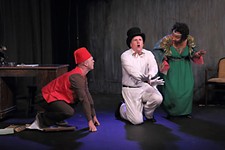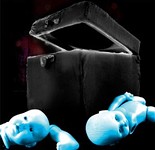Pale Idiot
The 10th-anniversary revival production of playwright Kirk Lynn's 'Pale Idiot' smartly unsnarls a taut knot of text and form
Reviewed by Heather Barfield Cole, Fri., Dec. 9, 2005
Pale Idiot
The Off Center, through Dec. 17
Running Time: 1 hr 20 min
What is an idiot? Who has the authority to label identity and intelligence? When does the application of logic and deductive reasoning become an idiotic experiment? An outcast is born from profane or malignant behavior. She is an illness in the group, one that must be extracted for the group to be healthy. Somebody – say a health inspector – must evaluate, test, scrutinize, question, and determine the conditions causing a disturbance in the communal peace, as shown in the 10th-anniversary revival production of playwright Kirk Lynn's Pale Idiot.
From a backdrop of jagged blue mountains snakes a long trail that empties onto the stage floor, where it's flanked by benches of concrete, motionless and immutable. A figure wearing a golden half-mask creeps into the expansive space of the Off Center. Frail, dirty, and beaten down, this moribund creature stares at us knock-kneed, waiting Beckett-like in droopy absurdity. Then this glum, silent idiot expands into an entrancing weaver of words, a vibrant moralist. Articulate and glowing as played by Adriene Mishler, she recites resounding stories of fairy-tale passion and mythic wonder. Opposing her are characters representing the moral and political gist of their contained community. A timid Altar Boy in neat sweater and buttoned shirt (Brock England) secures a Bible tightly between his arms. On the trail he meets his Mother's Maid (Jodi Jinx), who wears a frilly apron and hat. The Mayor's Assistant (Robert S. Fisher) in his clean suit stands in stark contrast to the Blacksmith's Apprentice (Lowell Bartholomee), with scruff and grime on his uniform and face.
It is this Blacksmith's Apprentice who, screaming as he enters, announces with an energy worthy of Paul Revere that the Health Inspector (Heather Hanna) is coming. The town wishes to be rid of their idiot problem, but the inspector must first verify who is an actual idiot. To that end, she subjects each member of the community to the "idiot test," a series of questions asked while the subject is attached to a retractable dog leash. With each question, a point of origin is located on the stage and from there the subject's movement in irregular geometric patterns map the space in ghostly diagram, the leash extending and pulling with umbilical elasticity. Hanna's Inspector smiles like Lewis Carroll's Cheshire cat, ready to pounce on wrong answers. But while her dogmatic interrogations hold tension, the constancy of their tone works us more into a stupefied trance, the clever puns and wordplay in Lynn's text washing over our attention. After each test, idiocy appears to be everyone and everywhere.
Director Michael Mergen smartly unsnarls a taut knot of text and form. The accelerated pace, a trademark of Rude Mechanicals shows, seems to clash with this play's darker, more vulnerable moments. This may be the intention of the word "pale," defined also as a process of fencing in, shown here as IQ pressure-tests that enclose bodies within boundaries of language. This theatre eludes a literal pale idiocy by collapsing lucid realism into the irrational and absurd humanism of heart.










